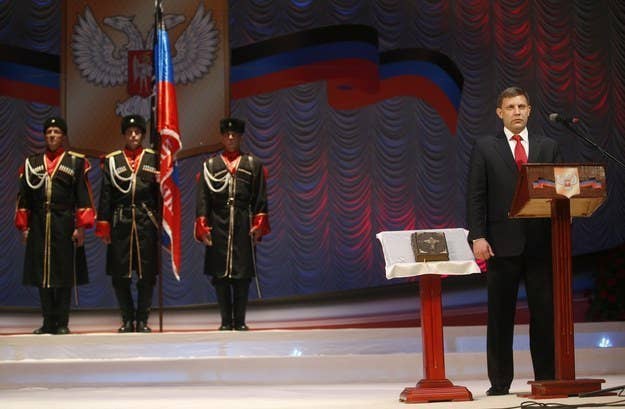
DONETSK, Ukraine — There's no country on earth that recognizes the self-proclaimed Donetsk People's Republic as an independent state, but that isn't stopping it from acting like one.
After winning a rebel-held election that Ukraine and its Western allies denounced as a "farce" on the weekend, Alexander Zakharchenko, a burly 38-year-old former electrician, was sworn in as leader of this pro-Russian rump state on Tuesday in an elaborate ceremony clearly aimed to underscore Kiev's loss of two rebel regions in the east.
"I swear to abide by the laws of the Donetsk People's Republic, to serve the rights and freedoms of its people honestly, and conscientiously fulfill my duties as leader," said Zakharchenko, who had swapped his trademark combat fatigues for a well-tailored suit, with his hand on a massive, glitzily embroidered Bible.
The inauguration had all the pomp and circumstance of a North Korean ceremony and the messy enthusiasm of a high school talent show. A Cossack guard of honor marched in with the republic's black, blue, and red flag.
Camouflaged men with guns closed down the street outside the theater hosting the inauguration, stood guard all over the building, and occupied many of the seats in the audience. (The theater, which has striven for a semblance of normalcy by staging repertoire material by the Russian writers Nikolai Gogol and Mikhail Bulgakov, even took down signs at the door asking guests to leave their weapons behind.)
Children read poems out loud praising Zakharchenko.
A traditional dance troupe including a man in a bear suit performed to the Russian folk classic Kalinka.
Alexei Zhuravlyov, one of Russia's most vitriolic xenophobic lawmakers, offered a friendly message of defiance: "Many Western countries would be jealous of elections like these," he said. "People across the ocean are deciding how you and we should live. It's ridiculous. They should come over here and see for themselves."
Petro Poroshenko, Ukraine's president, said the vote — clearly styled after Soviet votes aimed to reinforce leaders' popularity rather than encourage a democratic process — violated a ceasefire deal signed in Minsk in September and plans to abolish a law granting the region "special status." Events of recent days, however, suggest the deal was never worth the paper it was written on.
For a start, neither side actually ceased firing. Shelling at Donetsk's destroyed airport, one of the conflict's hot points, has grown louder in recent days. Zakharchenko has repeatedly vowed to retake several cities formerly under rebel control by force. BuzzFeed News saw two large unmarked military convoys presumably sent from Russia carrying anti-aircraft weapons and ammunition.
Starker still is the Minsk deal's failure to define the conflict in terms accepted by all parties. Kiev saw the ceasefire as a chance to return the territories to its control through Ukrainian local elections that Poroshenko set for Dec. 7. Rebel leaders, however, openly spoke of how its "special status" provision legalized their rule, and mocked Poroshenko for trying to abolish it.
"The law is legally worthless," Andrei Purgin, the republic's "deputy prime minister," told BuzzFeed News outside the ceremony. "Abolishing it is Ukrainian casuistry for an external audience."
For now, the Donetsk People's Republic and its sister group in neighboring Luhansk seem set to join the proud and lonely club of post-Soviet frozen conflict zones. The speaker of the South Ossetian parliament congratulated Zakharchenko from the stage. Venezuela and Cuba, Zakharchenko said, have agreed to "help economically."
That may not be the world of Ukraine and its Western allies, but it's a world they will most likely have to engage with on its own terms if the conflict is to be resolved. Kiev has shown small signs of doing this in the last few days, such as offering to buy coal from the republic's mines — the first time it has offered to pay local workers in months.
Recognizing the rebels even partially would be, of course, a much bigger step. But with the Minsk deal seemingly dead in the water, it may be a necessary one. Moscow has offered tentative backing to the rebel elections and started building up its forces in the east again, a sign it expects Ukraine to come to terms with the new normal it has dictated. Kiev and its Western allies may have no choice but to do so — Cossacks, dancing bear, and all.
